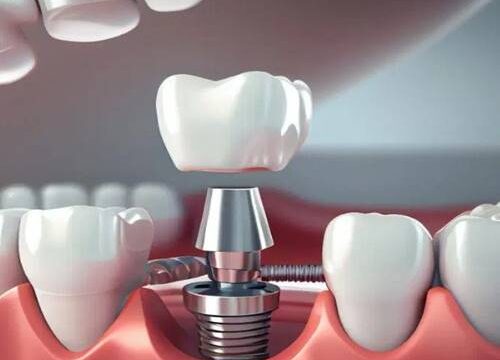
When it comes to replacing missing teeth, dental implants are often considered the gold standard. They’re permanent, natural-looking, and restore full functionality. But despite their many benefits, one question looms large in the minds of many patients:
👉 “Are dental implants painful?”
This is a completely valid concern. After all, the idea of placing titanium posts into your jawbone sounds intimidating. In this article, we’ll walk you through the truth about dental implant pain, what to expect during and after the procedure, and how discomfort is managed effectively.
What Are Dental Implants?
Before we dive into pain levels, it helps to understand what dental implants actually involve.
A dental implant is a small titanium post that is surgically inserted into your jawbone to act as a root for a replacement tooth. Once healed, a crown (artificial tooth) is attached, creating a strong, permanent solution that looks and feels like a real tooth.
Depending on your situation, you may receive:
- A single dental implant
- Multiple implants
- Full mouth dental implants (implant-supported dentures or bridges)
Is the Dental Implant Procedure Painful?
Here’s the good news: Most patients report little to no pain during the procedure itself.
That’s because the procedure is performed under local anesthesia, which numbs the area completely. Some dental clinics also offer sedation options—like nitrous oxide or oral sedatives—for patients with anxiety or those undergoing multiple implants.
During the Procedure:
- You will feel pressure and vibrations, but not pain.
- The implant is placed carefully into the jawbone through a small incision in the gum.
- The entire surgery usually takes 60 to 90 minutes per implant.
Patients often say the process is more comfortable than a tooth extraction.
What About After the Procedure?
You may experience mild to moderate discomfort after the anesthesia wears off, similar to other minor dental surgeries.
Common post-surgery symptoms include:
- Swelling around the gums or face
- Minor bleeding from the implant site
- Bruising of the gums or skin
- Mild pain or soreness, especially during chewing
These side effects typically last 3 to 5 days, and most patients manage them easily with:
- Over-the-counter medications like ibuprofen or acetaminophen
- Ice packs to reduce swelling
- A soft food diet for a few days
- Following the dentist’s post-operative care instructions
If the discomfort lasts longer than a week or becomes severe, contact your dentist right away to rule out infection or complications.
Pain During the Healing Period
After implant placement, your jawbone needs time to heal and bond with the titanium post—a process known as osseointegration. This can take 3 to 6 months, depending on your health and the implant location.
The healing process itself is not painful, but you may occasionally feel slight sensitivity or gum irritation, especially when chewing or brushing near the area.
Are Dental Implants More Painful Than Other Procedures?
Compared to other dental procedures, most patients find implants less painful than they expected.
Here’s a quick comparison of common dental treatments:
| Procedure | Pain Level (Typical) |
| Tooth Extraction | Moderate to High |
| Root Canal Treatment | Mild to Moderate |
| Dental Implant Placement | Mild (post-surgery) |
| Wisdom Tooth Removal | Moderate to High |
Pain perception varies by individual, but dental implants often rank low on the pain scale, especially with modern techniques and proper post-op care.
Factors That Influence Discomfort
Everyone’s experience is different. The level of discomfort can be influenced by:
- Number of implants placed
- Bone density and quality
- Need for bone grafting
- Location of the implant (front vs. back teeth)
- Individual pain threshold and overall health
If you need a bone graft or tooth extraction before the implant, you may experience slightly more soreness, but your dentist will manage your care accordingly.
How Dentists Minimize Discomfort
Experienced implant dentists use the latest tools and technology to make the procedure as comfortable as possible. Here’s how they help reduce pain:
- Advanced 3D imaging for precise placement
- Minimally invasive surgical techniques
- Sedation dentistry options for anxious patients
- Customized pain management plans
Be sure to communicate openly with your dental provider about your concerns so they can tailor the experience to your needs.
The Long-Term Benefits Far Outweigh Short-Term Discomfort
It’s natural to be nervous about pain, but keep this in mind:
✔️ Dental implants are a permanent solution that lasts 15 years or more
✔️ They restore full chewing power—no more avoiding your favorite foods
✔️ They preserve jawbone health, preventing facial collapse
✔️ They improve confidence, appearance, and overall quality of life
A few days of mild discomfort is a small price to pay for the life-changing benefits of dental implants.
Final Thoughts
So, are dental implants painful? Not in the way most people think. Thanks to modern anesthesia, sedation, and aftercare, the implant process is relatively comfortable, with minimal post-surgical soreness that fades quickly.
If you’re considering implants but hesitant because of fear or anxiety, talk to your dentist. They’ll explain the steps, set realistic expectations, and walk you through pain management options to ensure a smooth, worry-free experience.
Remember—your smile is worth it.
